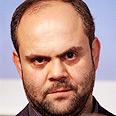
Hizbullah: War on Israel to widen
Organization's envoy to Iran says his group intends on firing long-range rockets into Israel in order to make Israel not safe for Israelis
Hizbullah's representative in Iran struck a defiant tone Monday, warning that his Islamic group plans to widen its attacks on Israel until "no place" is safe for Israelis.
Hossein Safiadeen also reinforced earlier threats by Hizbullah leader Sheik Hassan Nasrallah to widen the scope of attacks, which have included unprecedented missile strikes deep into northern Israel.
"We are going to make Israel not safe for Israelis. There will be no place they are safe," Safiadeen told a conference that included the Tehran-based representative of the Palestinian group Hamas and the ambassadors from Lebanon, Syria and the Palestinian Authority.
"You will see a new Middle East in the way of Hizbullah and Islam, not in the way of Rice and Israel."
Rice in Beirut
US Secretary of State Condoleezza Rice made a surprise visit to Beirut on Monday while en route to Israel. Rice met with Lebanese Prime Minister Faud Saniora about the surge in fighting along the southern border in the last two weeks.
Rice told him, "Thank you for your courage and steadfastness."
Safiadeen's comments reflected the deep opposition within Hizbullah to the efforts to broker a truce, including apparent attempts by Arab powers to pressure Syria into ending its support for Hizbullah, leaving Iran as the group's lone major backer.
Iran and Syria are the main sources of funds and equipment for Hizbullah, which was founded in the early 1980s and took inspiration from Iran's 1979 Islamic Revolution.
Syria said Sunday it was willing to work with the United States and others to press for an end to the worse Arab-Israel battles in 24 years _ but set conditions that Israel is unlikely to accept. Those conditions include a broader regional peace initiative that would discuss the return of the Golan Heights, which was captured by Israel in 1967.
Arab powerhouses Egypt and Saudi Arabia also were pushing Syria to end its support for Hizbullah fighters, Arab diplomats in Cairo said.
Safiadeen told The Associated Press he "had no news" about Syria considering withdrawing its support for Hizbullah, which touched off the crisis July 12 with a cross-border raid that captured two Israeli soldiers.
'Immigrants will leave'
"We will expand attacks," he said. "The people who came to Israel, (they) moved there to live, not to die. If we continue to attack, they will leave."
Israel claims Iran has supplied Hizbullah with long-range missiles, which have hit the port of Haifa and other places. Iran denies the charges but does not hide its high-level support for Hizbullah.
"This war will be remembered as the beginning of the end for Israel," Safiadeen said.
Nasrallah said in remarks published Monday that an Israeli ground invasion would not prevent Hizbullah from firing rockets into northern Israel.
"Any Israeli incursion will have no political results if it does not achieve its declared goals, primarily an end to the rocketing of Zionist settlements in northern occupied Palestine," Nasrallah told As-Safir newspaper. "I assure you that this goal will not be achieved, God willing, by an Israeli incursion."
Responding to reports about diplomatic efforts to end the fighting, Nasrallah said the priority was to end Israeli attacks on Lebanon, but he added that he was open to discussing initiatives.
Those attending Monday's conference included a top Foreign Ministry official and Gen. Mirfaisal Bagherzadeh of the powerful Revolutionary Guards.
The Palestinian ambassador, Salah Zavavi, said he believes the chances for a comprehensive political solution have passed. Israel also is battling Hamas-backed militiamen in the Gaza Strip claiming to hold an Israeli soldier missing since an ambush last month.
Hamas won Palestinian parliamentary elections last month but has been snubbed by Israel and many Western countries as it refuses to recognize Israel and renounce violence.
"The resistance groups will not accept a political end to this," Zavavi said. "They will not put down their weapons."










